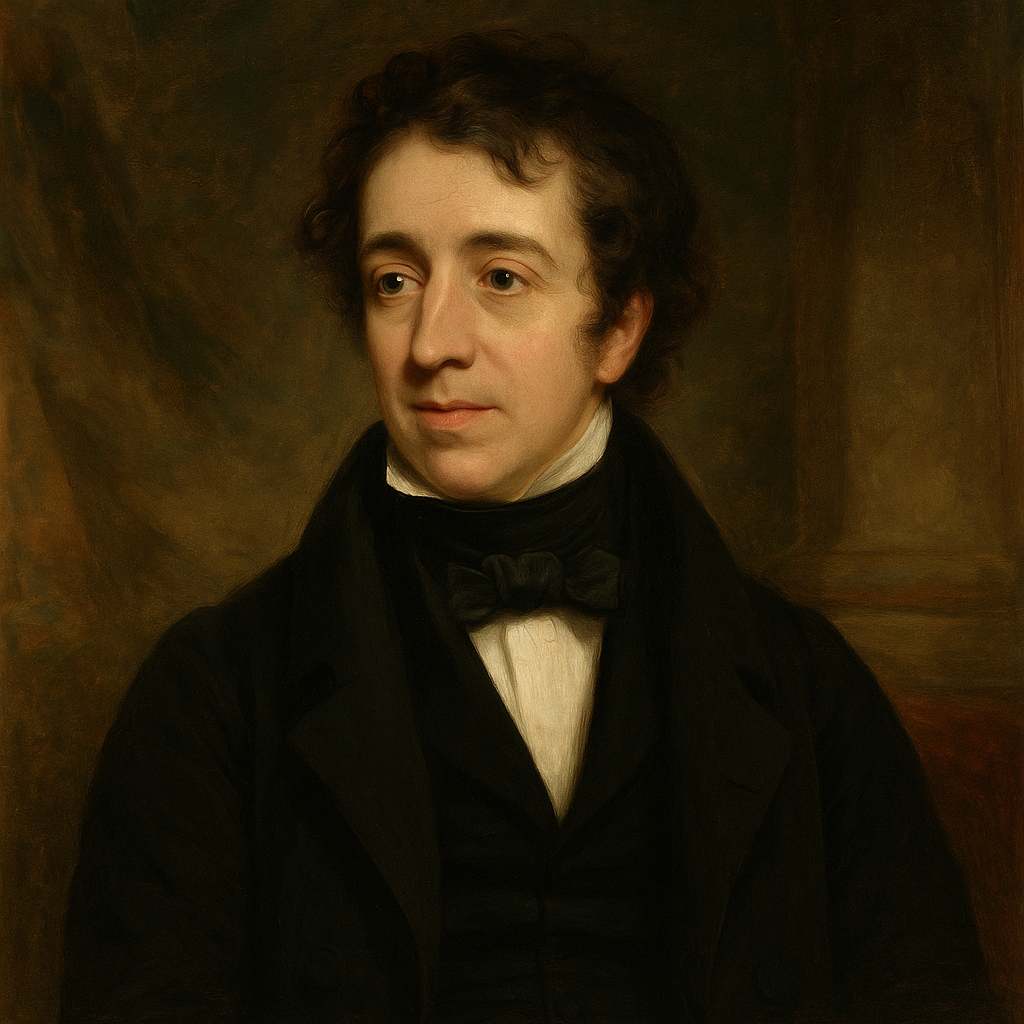Abou Ben Adhem
Leigh Hunt
1784 to 1859

Abou Ben Adhem (may his tribe increase!)
Awoke one night from a deep dream of peace,
And saw, within the moonlight in his room,
Making it rich, and like a lily in bloom,
An angel writing in a book of gold:—
Exceeding peace had made Ben Adhem bold,
And to the presence in the room he said,
"What writest thou?"—The vision raised its head,
And with a look made of all sweet accord,
Answered, "The names of those who love the Lord."
"And is mine one?" said Abou. "Nay, not so,"
Replied the angel. Abou spoke more low,
But cheerly still; and said, "I pray thee, then,
Write me as one that loves his fellow men."
The angel wrote, and vanished. The next night
It came again with a great wakening light,
And showed the names whom love of God had blest,
And lo! Ben Adhem's name led all the rest.
Leigh Hunt's Abou Ben Adhem
Introduction
Leigh Hunt's poem "Abou Ben Adhem" stands as a testament to the enduring power of spiritual narratives in English literature. This 19th-century work, with its deceptively simple structure and profound thematic depth, continues to captivate readers and scholars alike. Through a careful examination of its form, content, and historical context, we can uncover the layers of meaning embedded within this brief yet impactful piece. This essay will explore the poem's literary techniques, its theological implications, and its place within the broader context of Romantic poetry.
Historical and Literary Context
To fully appreciate "Abou Ben Adhem," one must first consider its historical and literary context. Leigh Hunt, a key figure in the Romantic movement, wrote this poem during a period of significant religious and social change in England. The early 19th century saw a growing interest in Eastern cultures and religions, partly fueled by Britain's colonial expansions. This fascination with the exotic is reflected in Hunt's choice of a Middle Eastern setting and protagonist.
Moreover, the Romantic era was characterized by a shift away from rigid religious dogma towards a more personal and inclusive spirituality. Hunt's poem, with its emphasis on universal love and compassion, aligns closely with this evolving religious sentiment. The work can be seen as a response to the strict Calvinism that had dominated much of English religious thought, offering instead a more humanistic approach to faith and divine favor.
Formal Analysis
The poem's structure is noteworthy for its simplicity and musicality. Composed of 18 lines in rhyming couplets, the poem maintains a steady iambic pentameter throughout, creating a rhythmic flow that mirrors the peaceful atmosphere of the narrative. This formal regularity contrasts with the supernatural events described, perhaps suggesting the harmonious coexistence of the earthly and the divine.
Hunt's use of enjambment is particularly effective, allowing the narrative to unfold smoothly across line breaks. For instance, the lines "Awoke one night from a deep dream of peace, / And saw, within the moonlight in his room," create a sense of continuity and gentle awakening that mirrors Abou's own experience. This technique also serves to maintain the poem's dreamlike quality, blurring the boundaries between sleep and wakefulness, the mundane and the miraculous.
The poem's language is characterized by its simplicity and clarity, eschewing complex metaphors or obscure allusions. This accessibility aligns with Hunt's democratic ideals and his belief in the power of poetry to reach a wide audience. However, this apparent simplicity belies the poem's deeper complexities and ambiguities.
Symbolism and Imagery
Hunt employs a rich tapestry of symbolism and imagery to convey his themes. The "moonlight" that illuminates Abou's room serves multiple symbolic functions. It creates an atmosphere of otherworldliness, appropriate for an angelic visitation, while also symbolizing spiritual illumination. The description of the room "Making it rich, and like a lily in bloom" evokes connotations of purity and divine grace.
The angel's "book of gold" is a potent symbol, representing divine judgment and the recording of human deeds. Gold, with its associations of value and incorruptibility, underscores the significance of this celestial ledger. The act of writing itself becomes a metaphor for divine will and the inscription of fate.
Perhaps the most striking image is that of the "great wakening light" in the poem's final stanza. This light, more intense than the earlier moonlight, suggests a greater spiritual awakening and the fulfillment of divine promise. The progression from moonlight to this greater illumination charts Abou's spiritual journey and ultimate vindication.
Characterization and Dialogue
The poem's effectiveness relies heavily on its characterization of Abou Ben Adhem and his interaction with the angel. Abou is presented as a figure of "exceeding peace," yet also possessing a boldness that allows him to address the divine messenger. This combination of serenity and courage paints Abou as an ideal spiritual figure, embodying both contemplation and action.
The dialogue between Abou and the angel forms the crux of the poem. Their exchange is marked by a formal politeness that belies its profound implications. Abou's initial question, "What writest thou?", demonstrates both his curiosity and his comfort in the presence of the divine. The angel's response, revealing that it records "The names of those who love the Lord," sets up the poem's central conflict.
Abou's reaction to learning that his name is not on the list is particularly revealing. His response, delivered "more low, / But cheerly still," shows his humility and unwavering positivity in the face of apparent divine disfavor. His request to be written as "one that loves his fellow men" is the poem's pivotal moment, encapsulating its central message about the nature of true spirituality.
Theological and Philosophical Implications
At its core, "Abou Ben Adhem" grapples with profound theological and philosophical questions. The poem challenges traditional notions of piety and divine favor, suggesting that love for one's fellow humans is ultimately more important than conventional religious devotion. This idea aligns with the humanistic ideals of the Romantic period and reflects a move towards a more inclusive and universal spirituality.
The poem's conclusion, where Abou's name "led all the rest" in the list of those blessed by God's love, can be interpreted in multiple ways. On one level, it suggests that compassion and humanitarian love are the highest forms of spiritual expression. More broadly, it implies a divine perspective that values actions over professions of faith.
This theological stance has implications that extend beyond the realm of religion. The poem advocates for a morality based on human relationships and mutual care, rather than adherence to abstract principles or dogma. In doing so, it presents a vision of spirituality that is inherently social and engaged with the world.
Literary Influences and Parallels
"Abou Ben Adhem" bears the influence of various literary traditions. Its Middle Eastern setting and the name of its protagonist evoke the tales of "The Arabian Nights," which were popular in Europe during Hunt's time. The poem's structure and tone are reminiscent of the ballad tradition, with its emphasis on narrative and dialogue.
One can also draw parallels with other works of Romantic literature. The theme of a nocturnal visitation by a supernatural being recalls Coleridge's "Kubla Khan," while the emphasis on human love as a path to divine favor echoes Blake's humanistic spirituality. The poem's message of universal love and compassion also aligns with the ideals expressed in Shelley's "Prometheus Unbound" and Wordsworth's "Ode: Intimations of Immortality."
Legacy and Interpretation
Since its publication, "Abou Ben Adhem" has been subject to various interpretations and has left a lasting impact on English literature. Its message of universal love has resonated with readers across different cultures and beliefs, contributing to its enduring popularity.
From a post-colonial perspective, the poem can be seen as an early attempt at cross-cultural understanding, albeit one still colored by Orientalist assumptions. The choice of a Middle Eastern protagonist to convey a universal message reflects both the expanding worldview of 19th-century Britain and its complicated relationship with the cultures it encountered through colonialism.
In the realm of religious studies, the poem has been cited as an example of the 19th-century trend towards a more inclusive and humanistic spirituality. Its message has been embraced by various faith traditions as well as secular humanists, demonstrating its broad appeal and adaptability.
Conclusion
Leigh Hunt's "Abou Ben Adhem" stands as a masterpiece of Romantic poetry, combining formal elegance with profound spiritual and philosophical insights. Through its vivid imagery, carefully constructed narrative, and powerful central message, the poem continues to challenge and inspire readers. It serves as a testament to the enduring power of literature to address fundamental questions of faith, morality, and human relationships.
As we continue to grapple with issues of religious tolerance and the role of spirituality in modern life, "Abou Ben Adhem" remains remarkably relevant. Its vision of a divine love that transcends sectarian boundaries and values human compassion above all else offers a compelling model for interfaith dialogue and universal ethics. In its brevity and seeming simplicity, the poem encapsulates the highest aspirations of Romantic poetry: to illuminate the profound through the accessible, and to find the universal in the particular.
This text was generated by AI and is for reference only. Learn more
Want to join the discussion? Reopen or create a unique username to comment. No personal details required!



Comments
No comments yet. Be the first to comment!